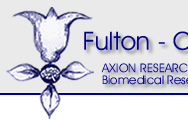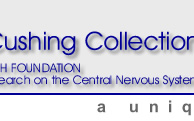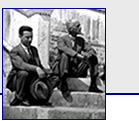

 Activities
Activities
-
 Tour the Fulton House
Tour the Fulton House
& Gardens
-
 Archives
Archives
-
 The Fulton-Cushing
The Fulton-Cushing
Committee
-
 Bibliography
Bibliography
 |
Harvey W. Cushing, MD
1869-1939
HARVEY WILLIAMS CUSHING, youngest of 10 children of Betsy Maria Williams and Henry Kirke Cushing, M.D., was born in Cleveland, Ohio, on April 8, 1869. He was fourth in a direct line of doctors. He entered Yale University in 1887, where he was on the baseball team and received his A.B. in 1891. He received his M.D. and M.A. from Harvard in 1895. After internship at Massachusetts General Hospital, he went through surgical assistant residency and surgical residency at Johns Hopkins (1896-1900). He spent the next year under Kocher and Kronecker in Bern, and Sherington in Liverpool, returning to Baltimore as Associate Professor of Surgery until 1912. His interests turned progressively toward the nervous system, although he continued to do general surgery. He was very active in the surgical laboratory, many of his early works being devoted to intracranial pressure, cerebrospinal fluid, the pituitary body, trigeminal neuralgia, eighth-nerve tumors and technical developments in neurological surgery.
He married Katherine Crowell of Cleveland in 1902. Their children were Henry Kirke, William Harvey, Mary, Betsy, and Barbara.
In 1912 he became Moseley Professor of Surgery at Harvard, a position he held until 1932, when he became Professor Emeritus. During this time, he was Surgeon-In-Chief at Peter Bent Brigham Hospital. In World War I, he was director of Army Base Hospital 5 from 1917-1919, and Senior Consultant in Neurological Surgery. He returned to Yale as Sterling Professor of Neurology (1933-37) and Professor Emeritus 1937. He was director of studies in History of Medicine at Yale (1937-39).
In the beginning of the 20th century he developed many of the basic surgical techniques for operating on the brain. This established him as one of the foremost leaders and experts in the field. Under his influence neurosurgery became a new and autonomous surgical discipline.
His achievements include:
- improved considerably the survival of patients after difficult brain operations for intracranial tumors
- used x-rays to diagnose brain tumors
- used electrical stimuli for study of the human sensory cortex
- was the world's leading teacher of neurosurgeons in the first decades of 20th century
Cushing's name is commonly associated with his most famous discovery - the Cushing's disease. In 1912 he discovered an endocrinological syndrome caused by a malfunction of the pituitary gland. He described it in his work The Pituitary Body and its Disorders. Cushing was also awarded the Pulitzer Prize in 1926, for a biography of one of the fathers of modern medicine - Sir William Osler. He died in 1939 in New Haven, Connecticut, and was interred in Lake View Cemetery in Cleveland.
More information about Harvey Williams Cushing is also available at the Cushing/Whitney Medical Library.
|







